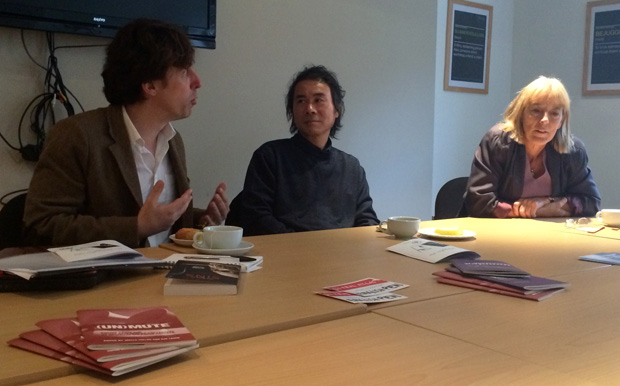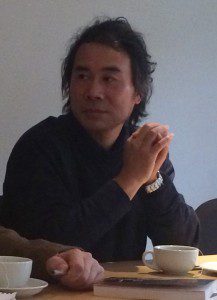17 Oct 2014 | Bahrain, Statements
Dear Mr. Hammond,
We are writing to you in light of your current tour of Gulf Cooperation Council countries regarding the arbitrary arrest and detention of human rights defenders Nabeel Rajab, Zainab Al-Khawaja and Ghada Jamsheer in Bahrain for cases of peaceful expression.
Nabeel Rajab, the President of the Bahrain Center for Human Rights, Director of the Gulf Center for Human Rights (GCHR) and Deputy Secretary General of the International Federation for Human Rights (FIDH), remains in prison following his arrest for a tweet in which he expressed his view about the role Bahrain security institutions play as “incubators of ISIS ideology”. Mr. Rajab had travelled to Bahrain from the United Kingdom following a European advocacy tour that included a panel at the House of Lords.
His detention has been criticised internationally. The United Nations has warned that it sends a “chilling message”. The Norwegian government has recently advised that the arrest of Mr. Rajab sends a negative message and has called for his immediate release. The European Parliament Subcommittee on Human Rights has voiced serious concerns over his arrest and detention and the United States State Department has called on Bahrain to drop the charges against him.
We urge the United Kingdom to add its voice to these universal calls. As a close ally to Bahrain, the UK has influence that could result in steps to release human rights defenders and political prisoners in Bahrain. You will recall that the UK signed a joint statement during the 26th session of the UN Human Rights Council, which urged the government of Bahrain “to release all persons imprisoned solely for exercising human rights, including human rights defenders some of whom have been identified as arbitrarily detained according to the UN Working Group on Arbitrary Detention”. We ask you to follow up on this statement by calling for the immediate and unconditional release of both Mr. Rajab and Ms. Al-Khawaja who have been detained solely for exercising their human right to free expression.
Zainab Al-Khawaja is a prominent activist in Bahrain, who is facing serious charges of “publicly insulting the King” after ripping a photo of him during a court hearing. The case, which runs contrary to Bahrain’s international human rights obligations, was immediately transferred to the Higher Criminal Court in Bahrain meaning that she now faces up to seven years in prison for a peaceful act of expression. It is important to note that Ms. Al-Khawaja is eight months pregnant, and faces the possibility of going into labour in arbitrary detention.
Amnesty International has criticised the decision and called for her immediate release arguing”laws that prohibit insults or the disrespect of heads of state or other public figures are contrary to international human rights law and standards”.
Her sister Maryam Al-Khawaja, Co-Director of the GCHR, is also facing prison on charges of assault brought against her after she arrived in Bahrain on 30 August to try to visit her father, jailed human rights defender Abdulhadi Al-Khawaja, founder of BCHR and GCHR. She was released after two weeks but is due in court on 5 November.
In addition to these cases, women’s rights defender Ghada Jamsheer was arrested and imprisoned on 15 September, on charges of defamation on Twitter. She remains in detention and will face court prosecution on charges related to her freedom of expression on 22 October.
The arrest and ongoing detention of both Mr. Rajab and Ms. Al-Khawaja threaten to destabilise further an already unstable country. It is imperative that human rights advocates are not targeted for exercising their human rights peacefully. The work of human rights defenders often requires criticising governments as noted by the European Union Guidelines on Human Rights Defenders, which call for this role to be “recognised and supported”.
We urge the British government to demand the immediate release of all detained human rights defenders and activists in Bahrain.
Thank you for your consideration.
Sincerely,
Americans for Democracy and Human Rights in Bahrain (ADHRB)
Bahrain Center for Human Rights (BCHR)
Bahrain Institute for Rights and Democracy (BIRD)
English PEN
Gulf Centre for Human Rights (GCHR)
Index on Censorship
Pen International
Redress
Reprieve
6 Oct 2014 | China, News

From left to right: Harvey Tomlinson from MakeDo Publishing, Chen Xiwo and translator, Nicky Harman at English PEN. (Photo: Aimée Hamilton)
Chen Xiwo, described as “one of China’s most outspoken voices on freedom of expression for writers” by Asia Sentinel, has spoken about how he challenged the Chinese government’s decision to censor his latest book ahead of its launch in English.
The Book of Sins is a collection of seven novellas exploring controversial topics including rape, incest and S&M and examine the links between sexual and political deviance.
A heavily censored version of the book was published in China, in which parts of the text, including an entire novella, were removed.
Xiwo launched a case to sue China’s customs agency in an attempt to find out why his book, which was published in full in Taiwan, had been confiscated when it arrived in China in 2007. He was originally told that it was its dark and pornographic nature that had led to it being banned in its complete form.
In an unprecedented move, Xiwo took the customs office to court. He said in the history of the People’s Republic of China, since 1949, there has never been a case of a writer suing for not being allowed to publish a book.
Originally when the court hearings got underway the domestic news outlets were able to report on the progress until the propaganda ministry sent out an order forbidding further coverage.
During a meeting today run by English PEN at the Free Word Centre in London, Xiwo said: “These days these kind of orders are usually just made by phone call, so they won’t send an email where there’ll be a record, they do it by phone.
“This makes it even harder to get to the bottom of who’s banning what and why they’re doing it, because there’s no record.”

Chen Xiwo (Photo: Aimée Hamilton)
Eventually the court ruled that Xiwo’s case was a matter of national security, which ended further questions on the topic. In a blog entry for Free Word, Xiwo writes: “The Book of Sins had been impounded because it was deemed a threat to ‘national security’. In fact, they completely dropped the charge of obscenity. That meant they did not have to divulge any further information, or even say who had made the final decision.”
Xiwo’s book has now been translated into English by prolific translator Nicky Harman, who said: “Chen is a highly moral writer in my view. The sex and the small amount of violence, it’s never gratuitous. He really focuses on feelings, he has a good attitude towards women, he’s not misogynistic.”
One of the most provocative stories within the book, I Love My Mum, is about a disabled man who strikes up an incestuous relationship with his mother which ultimately ends in him murdering her. The novella is metaphorical of Chinese society and remains banned in the country.
When asked if he would challenge the banning of his books again, Xiwo said that it is inevitable future books of his will be banned, but he cannot launch a case for every one of them.
Although Chen Xiwo has written 10 books, he says only six or seven of these have been published in their complete form. The Book of Sins has won an English PEN award. Chen Xiwo will be launching the English translation of the book at Waterstones Piccadilly, tomorrow 7 October, at 7pm.
This article was posted on 6 October 2014 at indexoncensorship.org
17 Jan 2014 | About Index, Campaigns, Statements
Leading free speech and privacy organisations call on the world’s elite assembled at Davos to tackle the challenge of global mass surveillance of electronic communications.
ARTICLE 19, English PEN, Index on Censorship and Open Rights Group are urging global leaders to discuss how states ensure security measures do not undermine rights and individual liberties, following revelations that the security agencies have been conducting secret mass surveillance of the digital communications of millions of people around the world.
The organisations said:
“The mass surveillance of our communications by the NSA, GCHQ and others undermines the right to privacy, free speech and media freedom. As such it is an assault on democracies and our societies. The leaders assembled at Davos must take a stand against surveillance – stop spying on us now.”
Secret mass surveillance is a threat to democracy and the rule of law.
If people are unable to know about the extent of government surveillance, we are unable to protect our fundamental rights.
When private communications are monitored by the state in secret, confidence in digital communications technology is unacceptably compromised, which has a severe chilling effect on freedom of expression and dangerously risks restricting the free flow of information.
Online surveillance programmes threaten to weaken the general security and privacy of communications systems and undermines trust in digital services. This has economic implications, as well as compromising the ability of people to express themselves.
We believe that:
Surveillance is only legitimate when it is targeted, authorised by a warrant, and when it is necessary and proportionate.
Mass population-wide surveillance is never justified.
Secret agreements that sanction mass surveillance undermine democracy. Citizens need a clear legal framework that governs state surveillance, in order to protect their rights.
All surveillance should be sanctioned by an independent judge on a case-by-case basis.
There must be effective, independent oversight of surveillance to command public confidence that such surveillance is not being abused.
For further information or interviews please contact:
Jo Glanville, Director, English PEN – tel 0771 302 0971
Kirsty Hughes, CEO, Index on Censorship – tel 07577 483 815
Jim Killock, Executive Director, Open Rights Group – tel 0789 449 8127
ARTICLE 19 – tel 0207 324 2510
Liberty
24 Apr 2013 | News, United Kingdom
Changes will be made to England’s defamation law after a three-and-a-half-year campaign, writes Padraig Reidy
(more…)


